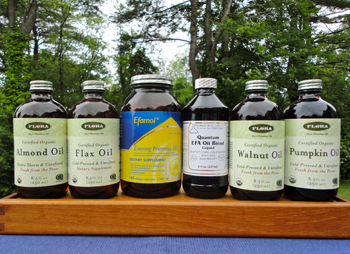Our bodies need certain high quality fats for two main reasons:
- Healthy fats contain important naturally occuring vitamins
- Healthy fats supply different types of fatty acids
We all seem to understand the need for vitamins, but the terms fatty acids, essentials fatty acids, as well as well as their types- saturated, monosaturated and polyunsaturated-can be confusing when it comes to meal planning. Then of course, there's the confusion about whether the oil can be heated and refrigerated. How much is too much before I start to gain weight?
Let's start start with the main types of fats, or fatty acids:
- Saturated
- Monounsaturated
- Polyunsaturated
Saturated fats: Animal fats including butter and tropical oils like coconut oil and palm oil are examples of products containing primarily saturated fats
- tend to be solid at room temperature
- consist of animal fats and tropical oils
- strengthen the immune system
- provide energy for the heart
- short- and medium-chain fatty acids
- antimicrobial-fighting pathogens in the gut
- help protect us from disease
- can be heated
- coconut oil should not be refrigerated
- Daily saturated fat recommendation: 6 tablespoons of a combination of these fats
Monounsaturated fats: olive oil, sesame oil, peanut oil, avacados, and nuts (almonds, cashews and pecans) are examples of products containing primarily monounsaturated fats
- liquid at room temperature
- solid when refrigerated
- need to be consumed in moderation
- need to be combined with saturated fat to be healthy
- Daily monounsaturated fat recommendation: 4 tablespoons of a combination of these oils/nuts/seeds
Polyunsaturated fats: cod liver oil, flax oil, evening primrose oil, black currant oil and borage oil are examples of products containing primarily polyunsaturated fats
- only needed in small amounts
- need to be refrigerated
- should not be heated
- Daily polyunsaturated fat recommendation: 1 tablespoon of a combination of these oils
The Best Healthy Oils to Eat!

